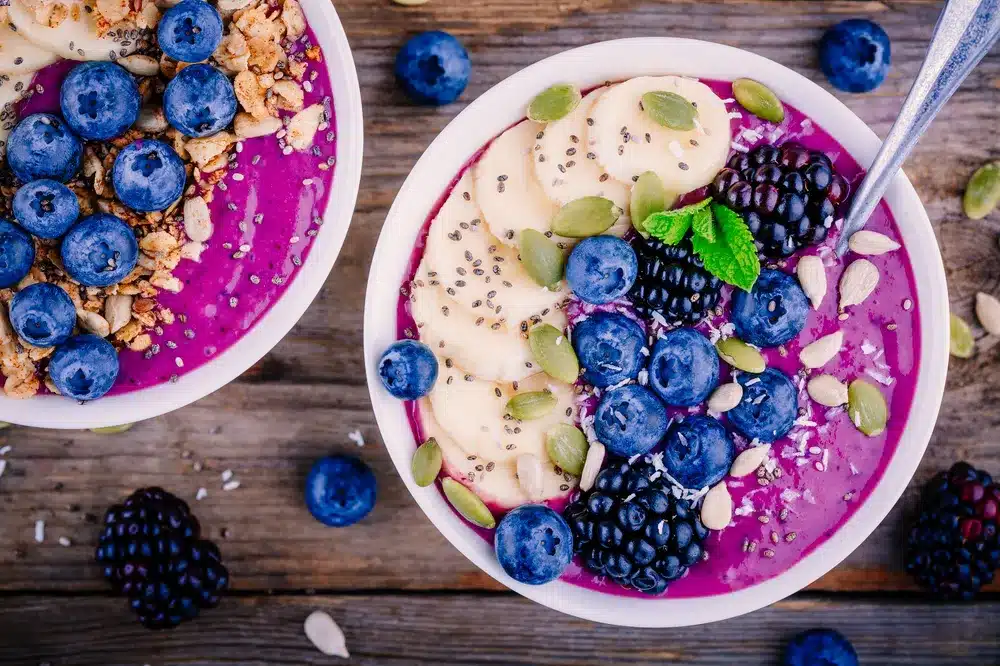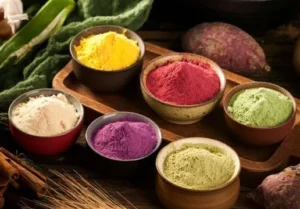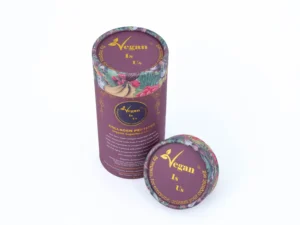Last updated on December 25th, 2024
Intermittent fasting has become a popular approach to health and weight management, offering benefits such as improved metabolism, better digestion, and increased energy levels. While the focus of intermittent fasting is on when you eat rather than what you eat, knowing the right foods and drinks to consume during fasting and eating windows is crucial. This blog explores intermittent fasting from a vegan perspective while highlighting that these tips can benefit everyone, whether you follow a vegan lifestyle or not.
What Is Intermittent Fasting?
Intermittent fasting (IF) is an eating pattern that alternates between periods of eating and fasting. Common methods include:
- 16/8 Method: Eating within an 8-hour window and fasting for 16 hours.
- 5:2 Diet: Consuming a regular diet for five days and significantly reducing calorie intake for two days.
- Eat-Stop-Eat: Fasting for a full 24 hours once or twice a week.
- Alternate-Day Fasting: Alternating between fasting days and regular eating days.
While intermittent fasting does not prescribe specific foods, choosing nutrient-dense options is essential for maintaining energy and supporting overall health.
Is Intermittent Fasting Suitable for Everyone?
Absolutely! Intermittent fasting is highly adaptable to various lifestyles, including vegan and non-vegan diets. For those following a plant-based lifestyle, the focus is on nutrient-rich vegan-friendly foods. However, the principles of intermittent fasting are universal, making it an excellent option for anyone looking to enhance their health, regardless of their dietary preferences.
What Can You Eat During Intermittent Fasting?
During the fasting window, the goal is to consume minimal to zero calories to allow the body to enter a state of metabolic rest. However, during the eating window, focusing on wholesome, nutrient-dense foods is key to replenishing your energy and supporting overall health.
Fasting Window: What’s Allowed
- Water
Staying hydrated is essential during fasting. Opt for plain water, sparkling water, or water infused with lemon or cucumber for added flavour. - Black Coffee
Coffee without milk, sugar, or cream is calorie-free and can help suppress hunger while boosting energy levels. Vegan-friendly plant-based creamers should be reserved for the eating window. - Herbal Teas
Enjoy herbal teas such as chamomile, peppermint, or green tea. Avoid sweeteners or additives to keep them fasting-friendly. - Apple Cider Vinegar
Diluted apple cider vinegar (1-2 tablespoons in water) can help with digestion and stabilise blood sugar levels. - Electrolyte Drinks
Look for zero-calorie electrolyte beverages to replenish lost minerals, especially during prolonged fasting periods.
Eating Window: Nutrient-Dense Foods for Everyone
When breaking your fast, prioritise nutrient-dense foods that nourish your body and replenish energy stores. These plant-based options are excellent for vegans but can also benefit anyone aiming for a healthier lifestyle:
- Whole Grains
Foods like quinoa, brown rice, oats, and barley provide complex carbohydrates for sustained energy. - Plant-Based Proteins
Lentils, chickpeas, black beans, tofu, tempeh, and edamame are excellent sources of protein. These options work well for everyone as a healthy alternative to animal-based proteins. - Healthy Fats
Avocados, nuts, seeds (chia, flax, hemp), and nut butters are great sources of healthy fats to keep you satiated. - Leafy Greens and Vegetables
Spinach, kale, broccoli, and sweet potatoes are packed with fibre, vitamins, and minerals essential for overall health. - Fruits
Fresh fruits like berries, bananas, apples, and oranges provide natural sugars and antioxidants to restore energy. - Fermented Foods
Include kimchi, sauerkraut, and plant-based yoghurts to support gut health. Fermented options can be enjoyed by all for their probiotic benefits. - Superfoods
Add chia seeds, spirulina, or nutritional yeast to meals for an extra nutrient boost. Nutritional yeast is especially beneficial as it’s often fortified with Vitamin B12, an essential nutrient for vegans and non-vegans alike. - Fortified Foods
Opt for fortified plant-based milks and cereals to ensure adequate intake of essential nutrients like calcium, iron, and Vitamin B12.
What to Avoid During Intermittent Fasting
To maximise the benefits of intermittent fasting, it’s important to avoid certain foods and drinks:
- Sugary Drinks
Avoid sodas, sweetened teas, and fruit juices during the fasting window as they contain calories that break the fast. - Highly Processed Foods
Limit consumption of chips, cookies, and other ultra-processed snacks during the eating window. These foods lack nutrients and can hinder your progress. - Refined Carbohydrates
Minimise white bread, pasta, and sugary cereals, as they can cause blood sugar spikes and crashes. - Overeating
While it may be tempting to eat large portions during the eating window, focus on balanced meals to avoid discomfort and maximise nutrient absorption.
Drinks to Enjoy During Intermittent Fasting
- Plant-Based Milks (During Eating Windows)
Almond, soy, oat, and coconut milks are excellent additions to smoothies or cereals. - Smoothies
Create nutrient-packed smoothies with plant-based protein powder, leafy greens, and fresh fruits. - Herbal Infusions
Experiment with refreshing herbal teas like hibiscus or rooibos for hydration and antioxidants. - Coconut Water
A natural electrolyte drink, coconut water is ideal for replenishment during eating windows. - Green Juice
Blend celery, cucumber, kale, and ginger for a refreshing, nutrient-dense drink.
Tips for Success with Intermittent Fasting
- Plan Your Meals
Prepare nutrient-rich meals ahead of time to ensure you’re meeting your nutritional needs. - Stay Hydrated
Drink plenty of water throughout the day to support your body’s natural detoxification processes. - Listen to Your Body
Pay attention to hunger cues and adjust your eating window or meal sizes as needed. - Start Gradually
If you’re new to intermittent fasting, ease into it by starting with a shorter fasting period and gradually increasing the duration. - Prioritise Nutrient Density
Focus on whole, unprocessed foods to ensure you’re getting the vitamins, minerals, and energy your body needs.
Benefits of Intermittent Fasting for Everyone
Combining intermittent fasting with a focus on nutrient-dense foods can amplify its health benefits. Here are some advantages:
- Improved Digestion: The fasting window allows your digestive system to rest and reset.
- Increased Energy: Whole, nutrient-rich foods provide sustained energy without the crashes associated with processed options.
- Weight Management: Intermittent fasting can help regulate appetite and promote fat loss.
- Enhanced Longevity: Studies suggest that fasting may support cellular repair and reduce inflammation, promoting a longer, healthier life.
- Customisable: Intermittent fasting can be adapted to suit any diet, whether vegan, vegetarian, or omnivorous.
Intermittent fasting is a flexible and effective approach to improving health. While this blog highlights plant-based foods and drinks, the principles of fasting apply to everyone. Whether you’re vegan, vegetarian, or omnivorous, intermittent fasting offers numerous health benefits. By focusing on nutrient-dense foods and staying hydrated with fasting-friendly drinks, you can maximise the benefits of this eating pattern.
At Vegan Is Us, we’re here to help you thrive on your health journey. Explore our range of vegan superfoods and supplements designed to support your well-being naturally. Visit Vegan Is Us to discover products that will complement your intermittent fasting plan and keep you energised, nourished, and thriving.







